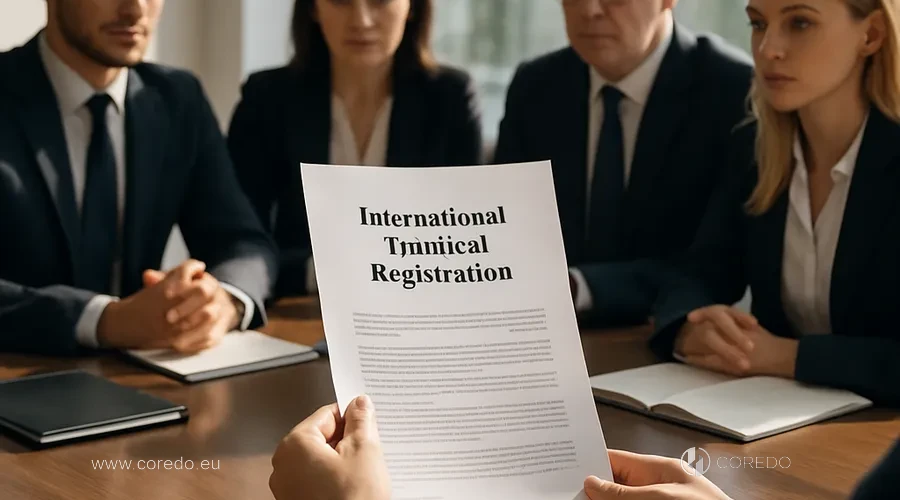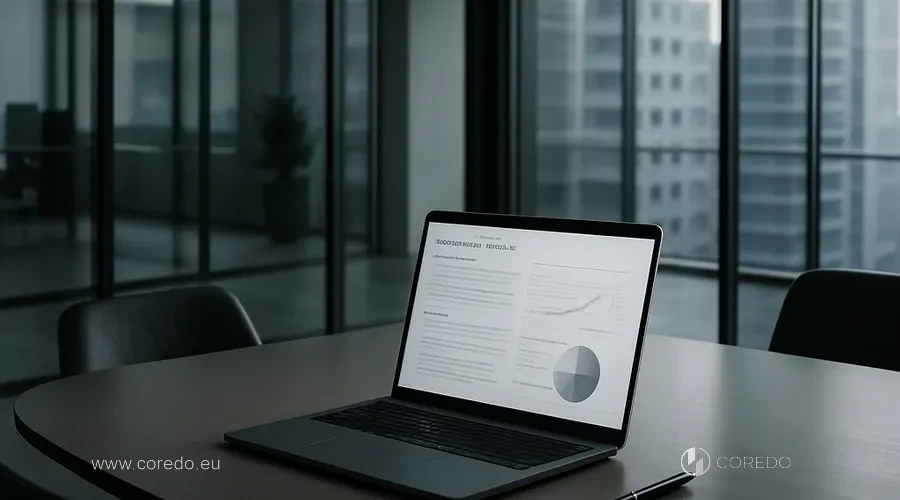In 2024, more than 65% of international companies entering new markets face delays and additional costs due to mistakes in choosing the market-entry model, Employer of Record or registering their own legal entity. One inaccurate estimate can cost a business millions of euros in missed opportunities, compliance fines, or loss of trust from local partners. Why do even experienced CEOs and CFOs make mistakes in this choice? How to avoid traps and build a strategy that will provide not only a quick start but also sustainable growth in new markets in the EU, Asia or Africa?
I am Nikita Veremeev, founder of COREDO. Over eight years of work the COREDO team has implemented dozens of international expansion projects for clients from Europe, Asia and the CIS. We have seen how a competent choice between Employer of Record and establishing a legal entity becomes the key to success, while an incorrect decision is a source of long-term risks.
If you want to take your business to a new level, avoid legal and tax traps, and build a reputation as a reliable player on the international stage: read to the end.
Employer of Record: company registration abroad

Employer of Record (EOR) is a service that allows companies to quickly hire employees and legalize employment relationships in any country without creating their own legal entity there. Essentially, the EOR becomes the official employer for your employees, takes on payroll compliance, HR and payroll outsourcing, benefits and compensation management, as well as compliance with all local HR procedures. This approach is especially in demand for expansion without creating a branch, launching temporary or project teams, as well as testing new markets in the EU, Asia or Africa.
Employer of Record in the EU, Asia and Africa
The mechanics of EOR differ depending on the jurisdiction. For example, in Europe the EOR takes on not only drafting employment contracts, but also payroll management, oversight of tax payments, and ensuring GDPR compliance when processing employees’ personal data. In Asia, where local labor legislation often changes, the EOR helps minimize internal risk controls and set up local bank accounts and settlements, ensuring transparency and speed of processes. In Africa, where many markets remain poorly structured, the EOR becomes a tool for legalizing employment relationships and managing personnel risks in international hiring.
EOR for international business expansion: advantages and risks
The key advantages of EOR are obvious:
- Speed of market entry: launching a team takes from several days to a couple of weeks.
- Reduction of administrative burden: all issues of payroll compliance, taxes, benefits and compensations are handled by the EOR.
- Minimization of compliance risks: the EOR is responsible for compliance with local labor legislation and regulatory employer requirements.
- Flexibility: easily scale the team, test new markets without creating subsidiaries.
On the other hand, there are risks:
- Limited control: strategic decisions on personnel management and corporate culture may be constrained.
- Impact on corporate structure: prolonged use of an EOR may raise questions from investors and partners about the company’s long-term plans.
- Brand trust in a new market: local clients and partners sometimes perceive an EOR as a temporary solution, which affects reputation.
Cost of Employer of Record services vs opening a company
The cost of EOR consists of a fixed fee per employee and additional expenses for HR and payroll outsourcing. Usually this is cost-effective for small teams or project tasks. Comparing the costs of EOR and having your own company shows: with a headcount of up to 10–15 people, EOR saves time and money, allowing you to avoid expenses for Due Diligence when registering a company, office rent, legal support and internal risk control.
A solution developed at COREDO for one of the clients in the Czech Republic showed: upon reaching a certain threshold (for example, 20+ employees or turnover exceeding 1 million euros), opening a legal entity becomes more beneficial in terms of tax optimization and strategic control.
When to register a company abroad?

Creating your own legal entity is the next stage of development for companies aiming for long-term business operations in the EU, Asia or Africa. Registering a company abroad allows you not only to formalize your market presence, but also to build corporate governance, open local bank accounts, obtain licenses (crypto, forex, payment services) and participate in government tenders.
Company registration and management in the EU, Asia, Africa
Registration procedures vary by country. For example, company registration in Singapore takes 3–7 days: you are required to choose a unique name, prepare the charter, appoint at least one local director and submit documents to ACRA. In Europe (Czechia, Estonia, Cyprus) the process can take from 2 weeks to 2 months and includes name verification, preparation of incorporation documents, opening a bank account and registration with tax authorities.
In Africa, especially when creating a subsidiary, partner due diligence and verification
the investment attractiveness of the jurisdiction and compliance with local corporate governance requirements. The COREDO team has repeatedly assisted clients at all stages – from choosing a jurisdiction to opening accounts and obtaining licenses.
Legal and tax nuances for business
COREDO solutions make it possible to build a transparent structure, minimize the risks of tax disputes and ensure payroll compliance for all employees.
Thus, registering a company abroad requires a comprehensive approach to managing legal and tax aspects, becoming a foundation for increasing trust and attracting investment.
The company’s impact on trust and investments
COREDO’s practice confirms: companies with a local structure are perceived as long-term partners, which is especially important in the EU and Asia, where reputation and corporate governance play a key role.
Employer of Record or company registration: which to choose?

Employer of Record or company registration – two fundamentally different approaches to entering a new market and onboarding employees. Your choice will depend on business goals, speed of launch and willingness to assume local legal obligations. Let’s consider how EOR differs from owning a company and what pros and cons each solution has.
Differences between EOR and owning a company
| Criterion | Employer of Record (EOR) | Legal entity (own company) |
|---|---|---|
| Speed of market entry | Very high (from a few days) | Medium/low (from 1-3 months and longer) |
| Compliance and risks | On the EOR side, minimal for the client | On the company side, expertise required |
| Cost | Transparent fee, beneficial for small volumes | High startup and operating costs |
| Control and flexibility | Limited control, flexibility across markets | Full control, strategic flexibility |
| Long-term prospects | Limited, suitable for market testing | Optimal for long-term goals |
When EOR is more advantageous than a subsidiary company
EOR is especially effective for:
- Quickly testing new markets without creating a branch.
- Temporary and project teams.
- Situations where it is necessary to minimize internal risk control and administrative burden.
- Companies not ready for significant investments in due diligence when registering a company and opening accounts.
EOR or your own company – how to choose?
| Evaluation question | EOR | Own company |
|---|---|---|
| Is launch speed necessary? | Yes | No |
| Is long-term presence planned? | No | Yes |
| Is the reputation of a local employer important? | No | Yes |
| Does team size exceed 15–20 people? | No | Yes |
| Is Licensing required? | No | Yes |
| Is full HR control critical? | No | Yes |
Transition from EOR to your own legal entity: when and how?

Transitioning from an EOR to your own legal entity becomes relevant when the business reaches a new stage of development abroad and there is a need to independently manage HR and legal issues. This transition requires a careful assessment of performance indicators to understand when opening your own legal entity is truly justified and how to properly organize the employee migration process.
Key transition metrics and ROI
The optimal moment for transition is determined by the following metrics:
- Headcount growth: if the team exceeds 15–20 employees.
- Turnover: upon reaching a certain revenue level (for example, 1 million euros in the EU).
- Need for licensing: the necessity of obtaining financial or payment licenses.
- ROI: calculating the total costs of EOR and comparing them with the expenses of opening and maintaining your own company. The COREDO team uses comprehensive ROI assessment models, taking into account not only direct costs but also indirect benefits – tax optimization, increased investment attractiveness, and reduced administrative burden.
Mistakes when transitioning from EOR to your own company
Common mistakes:
- Underestimating the timelines and complexity of due diligence during company registration.
- Ignoring the characteristics of local labor legislation (especially in Asia and Africa).
- Compliance breaches during employee transfers, which can lead to fines and legal consequences.
- Lack of a clear strategy for managing HR processes and HR automation.
Transition algorithm in practice: experience from the EU, Asia, Africa
- Cost-benefit analysis: calculating ROI, assessing costs for EOR and a company of your own.
- Legal audit: due diligence of partners, corporate governance analysis, document preparation.
- Planning employee transfers: drafting new employment contracts, compliance
- Automation of HR processes: implementation of tools for payroll compliance and benefits management.
- Opening bank accounts and obtaining licenses: support at all stages, setup of internal risk control procedures.
compliance with local labor legislation, data protection (GDPR, PDPA).
The COREDO team assisted clients in transitioning from an EOR to their own entity in the Czech Republic, Singapore and Dubai, ensuring not only legal clarity but also uninterrupted business processes.
Compliance and data protection with EOR and LLC

Compliance and data protection: key aspects when working with employees through an EOR and when operating through an LLC, especially in international business. Adherence to local and international requirements becomes a mandatory condition to minimize risks, protect the company’s reputation and ensure the legality of personal data processing. Below we will examine how these issues are addressed when hiring through an EOR in different countries.
Compliance when hiring through an EOR in different countries
Compliance when hiring employees through an EOR includes:
- Verification of regulatory requirements for employers.
- Implementation of internal risk controls.
- Updating employment contracts in accordance with local standards.
- Systematic audit of payroll compliance.
COREDO develops tailored solutions for clients, enabling the automation of controls and reducing the likelihood of errors.
Data protection and labor law in Europe, Asia, Africa
When working through an EOR, it is important to ensure that the provider guarantees the protection of employees’ personal data and that all processes comply with local HR procedures. In Africa, special attention is paid to the legalization of employment relationships and compliance with data storage requirements.
HR and payroll tools for business
Modern EOR platforms and in-house solutions allow automating:
- Management of benefits and compensation.
- Payroll compliance.
- Personnel record-keeping and reporting.
- Transfer of employees during M&A and business scaling.
Recommendations for international companies
- Choosing a market entry model: EOR is suitable for quick testing, temporary teams and starting without significant investments. A local legal entity: for long-term strategy, scaling and strengthening reputation.
- Transitioning from an EOR to a legal entity: determine the timing based on team growth, turnover, licensing needs and ROI calculation. Prepare a phased plan, taking into account legal and HR nuances.
- Compliance and data protection: implement automation, regularly audit processes, and consider local requirements (GDPR, PDPA).
- Avoid mistakes: do not underestimate the complexities of due diligence, do not ignore local labor law, invest in corporate governance and internal risk control.